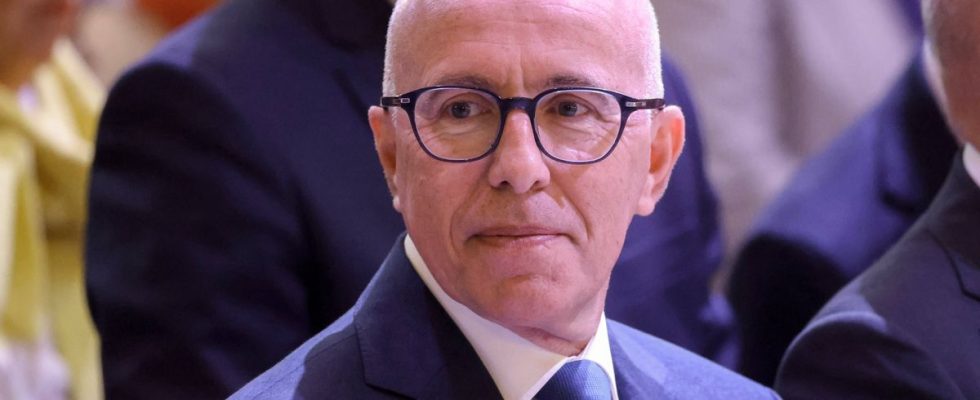There is something “sexy” about the Kingdom of Denmark. At least, for some politicians like Eric Ciotti, who flew to northern Europe on Tuesday. Accompanied by a handful of elected officials, the president of the Republicans is going to meet Danish officials to “analyze the policy of drastic reduction of migratory flows” of the Scandinavian state. An immigration policy – one of the most restrictive in Europe – which is a “model” for the right or the National Rally, and a subject of curiosity for many French political leaders.
“Social nationalism in the name of the welfare state”
On this migration issue, the small kingdom with 5.8 million heads has made a spectacular political change over the past twenty years, with an acceleration since the migrant crisis in 2015. Anti-ghetto plan, possibility of confiscating property at the arrival on the territory, restricted access to allowances, reinforced language tests and tests of knowledge of the history of the country, expulsions in the event of breach of the law, outsourcing of asylum… This battery of measures aimed at dissuading the arrival of foreigners was first set up by the right of government, under pressure from the nationalist party (the Danish People’s Party). Then, more unexpectedly, by the social democratic government, in power since 2019.
“The victory of the social democrats stems from a social nationalism assumed in the name of the welfare state. It is on this basis that restrictive migration policies were designed from the 2000s onwards,” explains the Foundation for Political Innovation (Fondapol), in a long note published last January. “Migration policy is now the subject of a consensus. In just over twenty years, the Danes have changed their majority several times, but never their migration policy, ”says the text.
The law on foreigners has thus been amended more than 130 times in twenty years, with the aim of restricting immigration and tightening reception conditions, repeatedly attracting criticism from international organizations. And the current Prime Minister, Mette Frederiksen, continues to defend the goal of “zero refugees”, while asylum applications have already fallen by more than 80% since 2014.
“It is a reference in terms of migratory control”
This policy, supported by an overwhelming majority of the Danish population, has reduced immigration to the issues of concern. “Between January 2020 and November 2022, this theme rose from second to eighth place,” reports Fondapol. These results do not fail to be scrutinized in France, where the migration issue is regularly the subject of tension. “Immigration transcends dividing lines in Denmark. They have succeeded in depoliticizing the subject, so that it is no longer taboo, as is too often the case with us, ”sighs Eric Pauget, LR deputy for the Alpes-Maritimes. “It is a reference in terms of migratory control. Our proposals are largely inspired by what has been done in this country, ”he adds, while LR presented this Sunday two bills on the subject.
The right is not the only one to take an interest in the Scandinavian case, often cited as an example by Eric Zemmour where the national rally. The government spokesman, Olivier Véran, was also in early May in the country of Hamlet. “I meet here, in Copenhagen, the leaders of the Danish political class […] to understand how this center-left has made a fairly significant ideological change that has allowed it to knock out the far right,” he explained. in an ambiguous video posted on Twitter. If the former socialist welcomed the electoral fall of the Danish People’s Party (fell from 21% in 2015 to 2.7% in November 2022 **), he did not support the policy carried out. Contacted by 20 minutes, his entourage specifies: “France will never go as far as Denmark, the measures cannot be duplicated for historical, cultural, geographical and legal reasons. But the left can and must talk about immigration. It is legitimate when it develops a discourse on the sustainability of the social model”.
To be or not to be Danish?
Among the majority, a certain curiosity is admitted. “It’s interesting, it’s a model that we look at. We can clearly see that when we are very clear about the principles, the far right recedes… ”, confides a deputy executive of Renaissance. On the left, the Danish program is often likened to that of the extreme right, but the electoral successes of the social democrats do not always leave one indifferent. “The left must be more present on immigration. When one has a vocation to govern, it is a political subject which one must seize, without falling into the trap of aligning oneself with the discourse of the right and the far right, ”we say in the entourage. of the communist Fabien Roussel.
However, in order to implement its restrictive migration policy within the European framework, Denmark benefits from a legal specificity. It is the famous op out (withdrawal option), negotiated after the initial rejection of the Maastricht Treaty in 1992, which allows it to derogate from European law. “If the Danes have an exemption, I do not see why France could not, defends Eric Pauget. This is the meaning of our proposal for a constitutional amendment to give priority, in certain cases, to national law over European treaties”. To be or not to be inspired by Denmark? The question should continue to agitate the French political class as the government’s immigration bill is due to be presented in the coming weeks.
* The Foundation for Political Innovation, which defines itself as a “liberal, progressive and European think tank”, is close to the French right. Its general manager, Dominique Reynié, was an LR candidate for the 2015 regional elections.
** This score is also explained by the emergence of a new populist party, the Democrats of Denmark (8.1%) and the result of The New Right, the nationalist party (3.7%).

